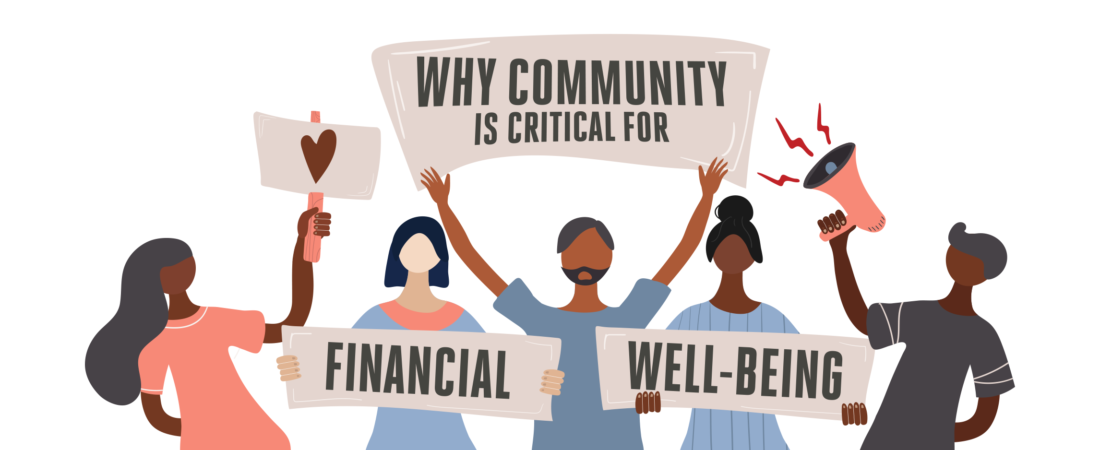
Why Community is Critical for Financial Wellbeing
About 14% of small businesses are veteran owned, yet vets are only 6% of the US population! Moreover, these businesses have a much higher 5-year survival rate. Although instilled military discipline certainly helps, the biggest factor in their success is community support.
Service men and women form tight-knit bonds and their willingness to support each other sustains and boosts profits. Some other interesting figures about the importance of community? Research shows that 70% of all jobs are not published publicly on jobs sites and as much as 80% of jobs are filled through personal and professional connections.
Networks are important for business and career progress, but also for personal financial welfare. A 2018 Survey by Mass Mutual found that Americans who interact with one another through friends and family, their neighborhood, professional networks, and religious groups have higher levels of financial confidence. This is a virtuous circle. Individual financial success leads to more home ownership and greater business facilitation. (And according to the SBA, these new establishments account for 69% of new jobs.)
In other words, people’s financial wellbeing strengthens communities, and these communities support them.
But why is community engagement and support so important? There are four factors at play here.
1. The Importance of Community Engagement
First, networks allow access to all those hidden employment and business opportunities that never get publicized. This factor is becoming even more important as the gig economy grows. Freelancers face high levels of uncertainty and unpredictability and cannot rely on a formal organization to advance their careers. For these people, community engagement is the best form of insurance out there.
For small business owners, connections can increase market visibility. It also exposes them to other entrepreneurs who can provide a form of informal mentorship and a place to get information on industry data, potential partners, suppliers, and employees. Even if this can be found through other means, it is quicker to access with a good network, saving a great deal of effort and cash.
2. Find a Mentor
Mentors can also act as free crisis-managers. Few business problems are unique, and there will be someone in a connected community who knows the right government person to call to expedite a resolution (or do damage control). Furthermore, this network can act as a rating system when it comes to assessing service providers like lawyers, accountants and contractors.
They can act as a sounding board for business decisions about locations, adoption of software and permits. Being known by fellow businesses can also add legitimacy and credibility to lenders and new customers. And for startups that don’t have venture capital firms and investment banks pursing them, networks can be an introduction to people willing to invest seed capital.
3. Providing Community-Based Customer Care Creates Loyalty
Community support on a customer level is also vital, especially during periods of uncertainty and economic downturns. Trust is becoming more important in an increasingly online world. For example, Zappos has a surprisingly loyal customer base due to their focus on customer service. After a large hack in January 2012, they reached out immediately with apology emails. They braced for customer backlash and migration, which never came!
Customers were willing to overlook the breach given the years of consistently customer orientated service that Zappos is famous for. Small businesses cannot afford the same free shipping and returns that Zappos can, which makes their reliance on community support more critical in the face of something like a cyber attack (or pandemic).
4. Community Engagement for Personal Wellbeing
Okay, so community engagement is important for career and business success. But what about personal wellbeing? The pandemic has highlighted just how vital personal community engagement is. Access to loans from neighbors and family helped cover immediate financial needs. Perhaps even more important than cash, communities were a source of volunteers and people willing to look after children and older dependents.
This type of aid boosts productivity and reduces burnout. When you add the non-tangible benefits of ‘belonging’ and feeling supported, it is clear that community support and engagement is a truly powerful contributor to overall financial wellbeing.
***
Read this next: How You Can Pay Off Debt This Year
Taking the steps to get out of debt gets you one step closer to financial freedom. Partner with Greenwood to help you build wealth, and get your money right while giving back and supporting Black and Latino communities.